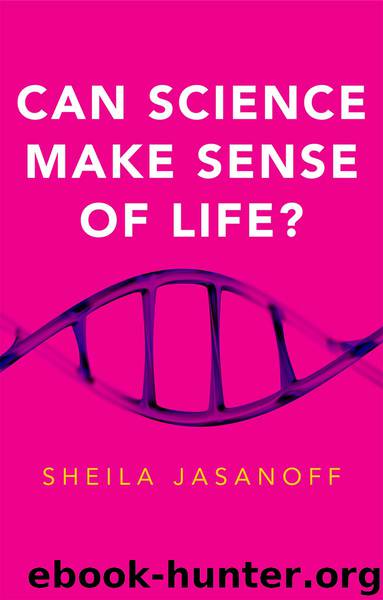Can Science Make Sense of Life? by Sheila Jasanoff

Author:Sheila Jasanoff
Language: eng
Format: epub
ISBN: 9781509522743
Publisher: Wiley
Published: 2019-01-23T00:00:00+00:00
There is here a sense of confident empiricism, backed at the same time by tolerance toward religious belief, a presumption that if people would only “think,” they would come together around a sensible common norm, one ratified by centuries of religious thought reaching all the way back to St. Augustine. That sentiment echoes more than thirty years later the Warnock report’s faith that it is possible to have the kind of society that all members can “praise and admire,” even when differing on details here and there. And one indispensable element in forging that consensus is the voice of a Warnock or a Jardine who, through some combination of professional experience, social standing, and record of public service, can presume to speak sense for the British public, if not for all humanity.
It would be hard to imagine a constitutional order less like Britain’s than the political struggle over governing emergent forms of human life that erupted in the United States. At bottom lies that nation’s peculiarly toxic politics of abortion, unresolved since the Supreme Court’s landmark 1973 decision in Roe v. Wade. There, the Court recognized women’s basic right to terminate their pregnancies, although the right has been overlaid with an increasingly incoherent and restrictive patchwork of state-by-state regulation. Those dynamics polarized long since into sloganeering, pitting the “prochoice” movement against its “pro-life” adversaries, the former backing adult women’s right to choose their own reproductive futures, the latter bent on staking out personhood claims, and state intervention, on behalf of the unborn. Although Mary Warnock’s question (is the lab-created embryo “to be treated as a collection of cells or as a baby”?) resonated in the US context, American answers were bound up from the start with preconceived notions of fixed and inalienable rights triggered by the factual question the Warnock committee so assiduously avoided: when does life begin? Public opinion concerning the beginning of fetal life and the moral worth of the IVF embryo thus remains sharply divided, and settlements are achieved not through elite leadership and guided consensus, but at the polling booth and in the shadowy dynamics of federal legislative politics.
Several episodes over approximately two decades of political strife illustrate why the constitutional pushes and pulls of the US system have failed to stabilize a governance paradigm similar to Britain’s fourteen-day rule and oversight through the HFEA. The first occurred in 1996, with the passage of the Dickey–Wicker amendment to the federal appropriations bill passed in January of that year. Authored by Republican congressmen James Dickey of Arkansas and Roger Wicker of Mississippi, the amendment simply bans the use of federal funds to create a human embryo for research or to support “research in which a human embryo or embryos are destroyed, discarded, or knowingly subjected to risk of injury or death greater than that allowed for research on fetuses in utero.”4 The amendment, annually renewed since its first enactment, was never publicly debated: a crisis atmosphere following two paralyzing government shutdowns made all sides hastily come together on getting an appropriations bill approved as quickly as possible.
Download
This site does not store any files on its server. We only index and link to content provided by other sites. Please contact the content providers to delete copyright contents if any and email us, we'll remove relevant links or contents immediately.
Enlightenment Now: The Case for Reason, Science, Humanism, and Progress by Steven Pinker(7306)
A Journey Through Charms and Defence Against the Dark Arts (Harry Potter: A Journey Through…) by Pottermore Publishing(4798)
The Immortal Life of Henrietta Lacks by Rebecca Skloot(4571)
A Journey Through Divination and Astronomy by Publishing Pottermore(4378)
Elon Musk by Ashlee Vance(4120)
Origin Story: A Big History of Everything by David Christian(3681)
COSMOS by Carl Sagan(3617)
Alchemy and Alchemists by C. J. S. Thompson(3513)
Bad Pharma by Ben Goldacre(3420)
Enlightenment Now by Steven Pinker(3366)
Shadow of Night by Deborah Harkness(3356)
Inferior by Angela Saini(3311)
A Mind For Numbers: How to Excel at Math and Science (Even If You Flunked Algebra) by Barbara Oakley(3294)
Origin Story by David Christian(3194)
The Code Book by Simon Singh(3177)
Signature in the Cell: DNA and the Evidence for Intelligent Design by Stephen C. Meyer(3125)
The Elements by Theodore Gray(3050)
A Brief History of Time by Stephen Hawking(3022)
A Journey Through Potions and Herbology (A Journey Through…) by Pottermore Publishing(2844)
